We may earn a small commission on some links at no extra cost to you. Learn more.
If you’re looking to kickstart your strength training, leveraging a weightlifting app can provide you with the guidance, support, and motivation you need to reach your goals and targets quicker.
From tracking workouts with ease, to building out a personalized training plan, it’s like having a Personal Trainer in your pocket during your workouts.
Features such as exercise demonstrations, logging workout stats (such as weight used, reps and sets), advice on when to take rest days, and relevant exercise alternatives, are why so many gym goers are deciding to use these apps to assist them during workouts.
In this roundup review of the best weightlifting apps, we guide you through 9 apps that stand out for us and explain who each app is best suited to.
(We’ve also managed to negotiate some unique discounts on some apps to help you get started).
FEATURED WEIGHTLIFTING APPS
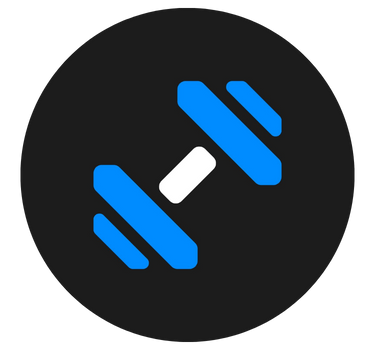
ALPHA PROGRESSION
Best overall.

FITBOD
Best for beginners.
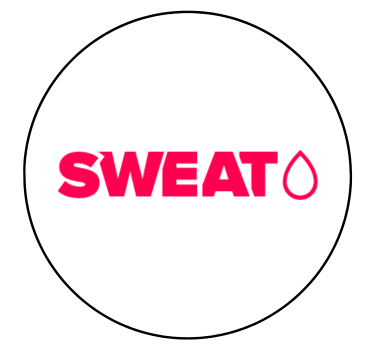
SWEAT
Best for women.

PLIABILITY
Best for recovery.
Why Trust Us? Review Process Explained
Here at Fitness Drum, we believe in editorial integrity and providing genuine value to our readers. For this review, we tried and tested 17 popular fitness apps (referenced at the bottom of the page) and rated each app based on price, ease of use, workouts, exercise demonstrations, unique features and overall effectiveness.
Alpha Progression – Best Overall

Alpha Progression
Powerful features designed to help you track workouts more efficiently, uses artificial intelligence to customize your workouts.
Alpha Progression comes with fantastic features, such as a rich exercise video library, detailed descriptions, easy logging and A.I. generated workout programs. As far as A.I. generated workouts go, we’ve found Alpha Progression to be very effective, reliable and generally more accurate than others we’ve tried.
Similar to Fitbod, it allows you to input available equipment, gym experience, goals and other attributes, to allow the app to generate personalized workouts and strength-based fitness plans.
We selected Alpha Progression as the best overall app because of the ability to track and log workouts so effortlessly and have reliable recommendations when it comes to reps, sets and workouts based on your goals.
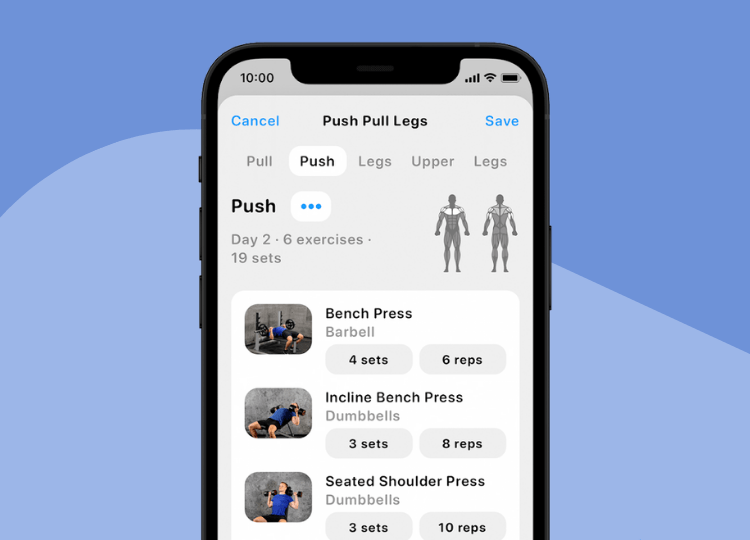
The focus on “volume” lifted as opposed to 1RM lends itself better for bodybuilding and hypertrophy routines… but it could be used for any sort weight lifting routine.
For more info, check out our detailed Alpha Progression review, that outlines what it’s like using the app on a daily basis and the results we got.
Alpha Progression have also very kindly offered Fitness Drum readers a unique 20% discount, on top of the free trial, to help you get started. Simply click here to have the discount automatically applied to your account.
Fitbod – Best for Beginners

Fitbod
Award winning fitness app that harnesses artificial intelligence to generate customized workout plans.
Fitbod offers a simple but effective solution for weightlifting.
It is very affordable, has incredibly positive reviews (especially considering the large userbase), and undoubtedly helps improve your strength and fitness via effective workout plans.
The app uses a nifty algorithm to help create a continuous workout plan that evolves and changes with your personal performance. Fitbod will interpret previous workouts and take into consideration your overarching goal, and create very customized workouts for you to complete.
Perhaps you’re progressing quickly, or not, it doesn’t matter, Fitbod will help ensure the workouts stay challenging but achievable. This creates a motivating environment that really helps keep you excited about exercising and lifting weights.
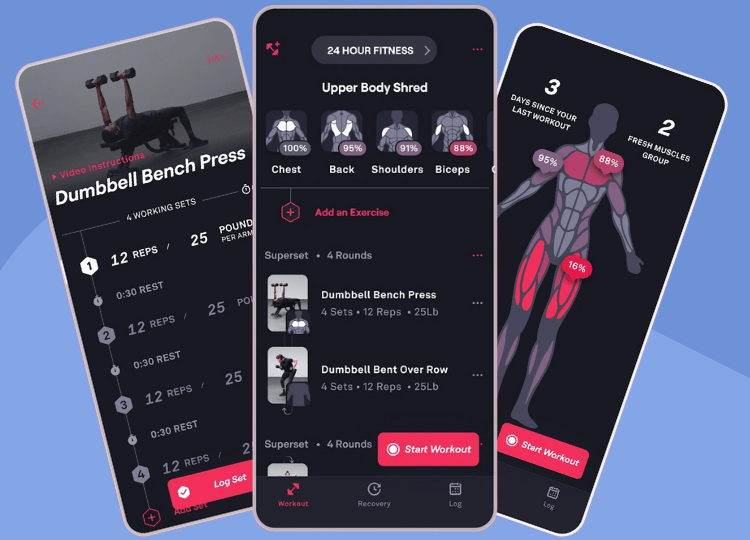
Fitbod’s recommendations also adjust based on the equipment available, ideal if you’re mixing between at-home workouts and going to the gym.
We selected Fitbod best for beginners because we feel all these features really help take the guess-work out of strength training and provide a clear program to follow.
To learn more about Fitbod, check out our detailed Fitbod review.
We’ve managed to get our readers a unique 25% discount code to help you get started, making it just $5/month! Simply follow this link, or use DRUM25 on the redeem code page.
Sweat – Best for Women

Sweat
30+ million downloads, 34,000+ 5 star reviews, quality workout programs, meal planning, progress tracking and community.
Sweat, the fitness app founded by Kayla Itsines, has been making its users break a sweat since its inception in 2015… and is going from strength to strength.
Primarily targeting a female audience, Sweat’s app makes it easy to follow along to carefully crafted fitness programs, to help with common health goals such as losing weight and getting stronger.
Although Sweat may not be synonymous with lifting weights, the app includes a lot of programs and workouts around resistance training (which is probably why users find it so effective for achieving their goals)… making it a worthy contender for anyone looking for a strength training app.
If you’re new to strength training, we’d recommend the High Intensity Strength program to get started, as it provides a great introduction to Sweat’s strength-based workouts.
Unlike other apps on this list that would be either be described as a “workout logger” or a “on-demand workout class”, Sweat offers a great hybrid that allows you to follow exercise demonstrations in real-time and track your results to monitor your progress over time.
This lends itself really well for HIIT and circuit training… so if this is how you want to structure your strength training, Sweat is definitely a great choice.
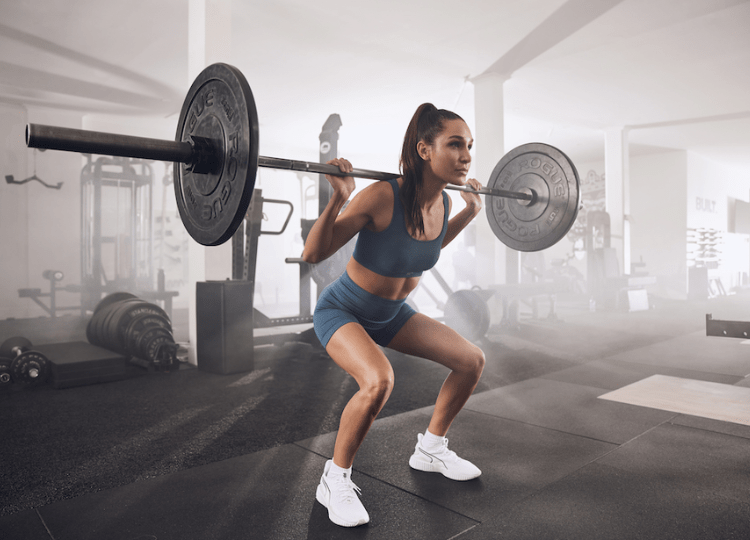
From the apps we’ve tested (which is pretty much every fitness app under the sun at this point), Sweat is second-to-none when it comes to quickly tailoring workouts to your preferences. You can swap exercises for relevant alternatives and skip exercises you can’t do.
Sweat also uses quality gifs to show you how to do each movement. From x planks to b-stance deadlifts, and everything in between, this is really useful for beginners and those who want extra guidance.
We selected Sweat as the best weightlifting app for women because the app goes above and beyond when it comes to delivering exceptional content that is targeted to this audience. With programs around toning and sculpting (which yes, involve a lot of resistance training) to those around pregnancy and new moms, we think Sweat is perfectly positioned to help a lot of women get the most out of strength-based workouts.
You can read our full Sweat app review for more details on what it’s like to use.
Pliability – Best for Recovery

Pliability
Improve mobility and flexibility with 1500+ mobility sessions, daily routines, mobility test feature for custom recommendations.
Pliability (previously ROMWOD) is a mobility app with over 1,500+ routines designed to help you move better, recover faster and ultimately improve athletic performance.
If you’re serious about lifting weights, recovery needs to become a priority in your weekly fitness sessions… and Pliability makes this simple and enjoyable to do.
Pliability helps you reach new personal bests and push through strength training plateaus by improving joint range of motion and muscle flexibility.
Using evidence-based mobility workouts, you can use the app to better aid recovery between weightlifting sessions, which will likely improve your performance in the gym.
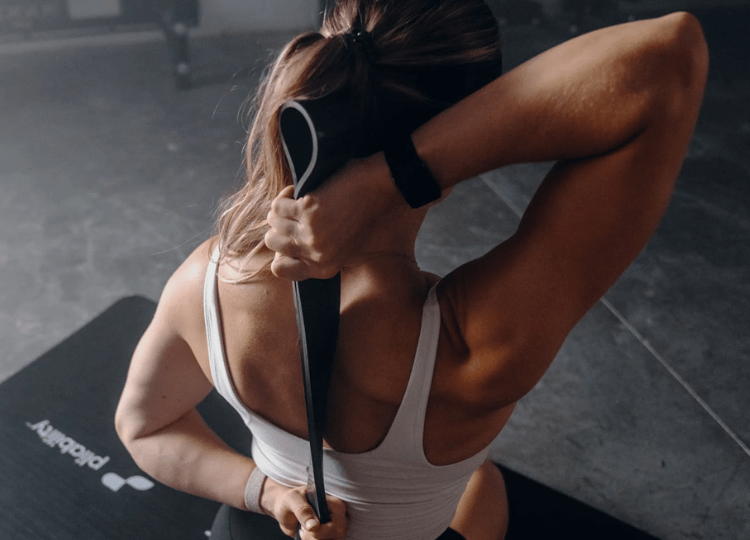
A feature we particularly like is the mobility test, which creates a “mobility score” for you based on a series of movements and a customized plan based on any areas of weakness.
We selected Pliability as the best app for recovery because the mobility sessions are very effective and include such a variety of routines. Due to the app originally being positioned for CrossFit, Pliability’s mobility sessions are ideal for anyone doing Olympic lifts.
Stiff shoulders and tight hips will be a thing of the past!
It doesn’t include any weightlifting workouts or workout logging though, so if want those features, you’d need another app as well.
You can currently grab a 7 day free trial before committing to a membership too.
JEFIT – Best Free Version
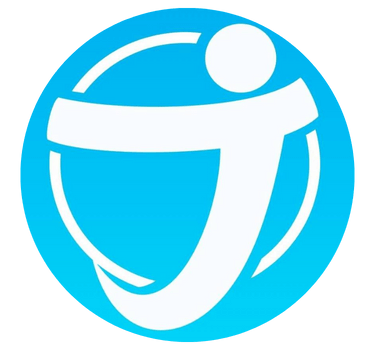
JEFIT
Great free app that includes clear video demos, log each exercise with ease, 1,400+ exercises to choose from.
JEFIT promotes itself as quite a broad fitness app, but it’s really gained traction and momentum as a weightlifting app. The tools are very much aligned with what you want if you’re lifting weights.
JEFIT has the most robust free version of all the apps, hence how it has gained such a large number of downloads (around 8.8 million).
The premise of JEFIT is pretty simple…. create a plan, track your progress and review the results.
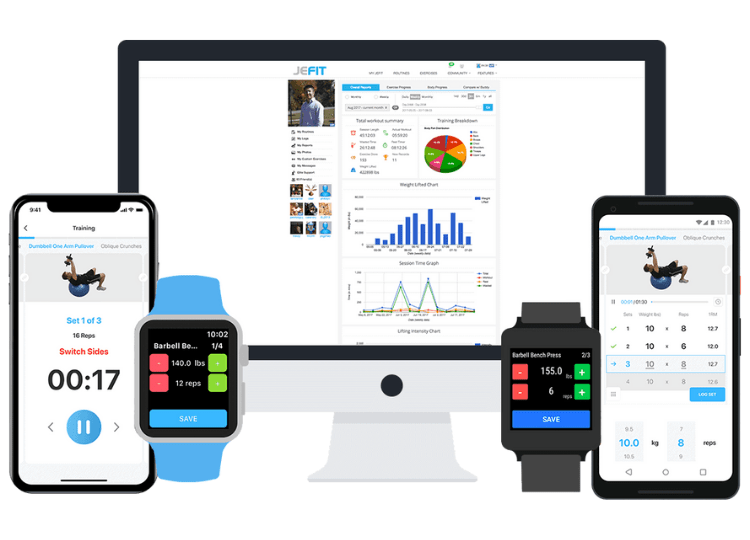
JEFIT includes a vast library of exercises… well over 1,000. This means if you’re looking to create varied weightlifting plans, JEFIT has you covered.
There is a slight feeling over getting overwhelmed by the number of exercises and potential workouts to include in your plan, so if you’re a beginner, you may end up creating quite ineffective exercises as you try and include too much.
BodyFit – Best for Bodybuilding
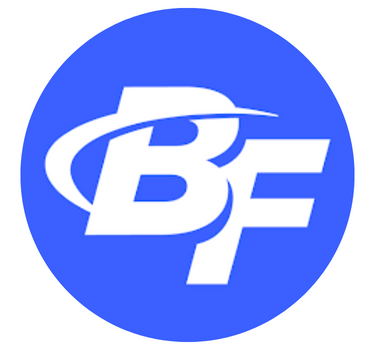
BodyFit
3,500+ exercises, 2,500+ workouts created by expert coaches, 90+ coaching plans, track and record your workouts.
BodyFit is the premium content service and workout app from Bodybuilding.com. The app leans heavily towards those who enjoy traditional bodybuilding style routines and opens up an extensive library of expertly crafted workout routines.
To their credit, bodybuilding.com uses some of the best strength coaches to produce their content, who provide really useful insights into strength training and hypertrophy.
As well as accessing the app, your membership will also unlock extra content on bodybuilding.com and a 10% off their online store too.
We selected BodyFit as the best for option for bodybuilding because the routines and workouts are largely geared towards that style of weightlifting. If you want to pack on muscle or shed extra weight, BodyFit won’t disappoint.
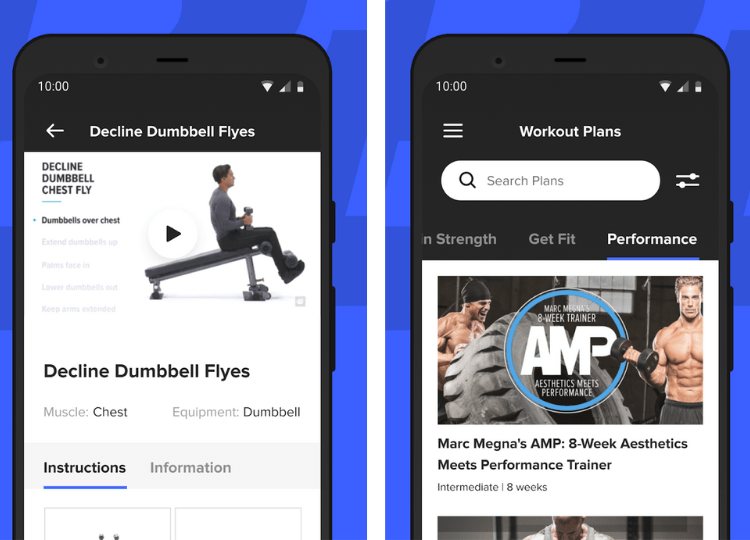
When using the app, you can find relevant training plans by goal, such as strength, weight loss or building muscle. You’re also able to track your workouts to monitor your progress.
We found BodyFit’s exercise demonstrations to be very good as well… great for beginners who want additional pointers on how to execute each exercise correctly.
BodyFit’s strength is in the expertly designed programs… but if you prefer creating your own workouts, apps like Alpha Progression and Fitbod are better suited.
BodyFit’s app also includes plenty of nutritional content, but this obviously promotes a lot of bodybuilding.com’s supplements, so bear that in mind.
Strong – Best for Tracking
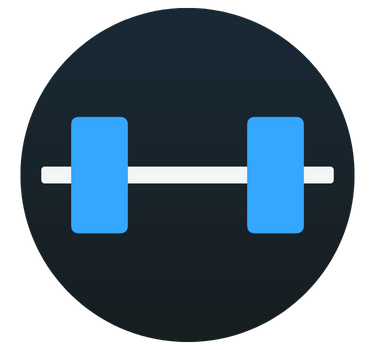
Strong
Simple workout logger, notepad feature to record additional details about your workout.
The aptly named “Strong” is a simple but effective weightlifting app, offering an intuitive way to track and record your workouts. Available on Apple Watch as well as mobile devices, its value proposition is quite simple… keep it simple.
As many other apps look to add new features, and spread themselves too thin, Strong really focuses on what it does, and making sure it does that very well.
If you really just want a tool to track your workouts, and help provide a bit of reporting to your strength training, then Strong is worth considering.
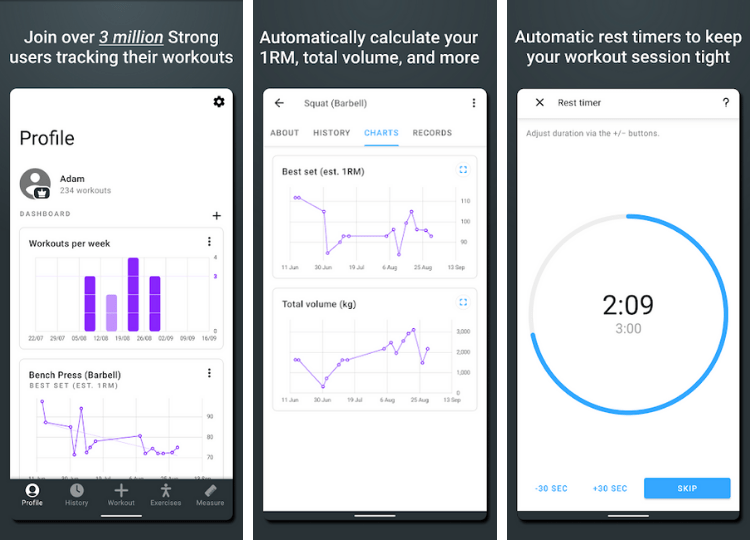
We selected Strong as best for tracking as it really makes tracking your workout stats very easy. Having 1RM, total volume, and other key performance metrics at your fingertips is great for evaluating your gains.
The plate calculator is a particular feature we really like.
The exercise library is undoubtedly large, but it doesn’t really give too much attention to HIIT or functional movements and is more suited to your traditional weightlifting routines (i.e. barbell, dumbbells, etc). If you use slightly unusual equipment, it may be less intuitive for tracking.
Stronglifts 5×5 – Best for Compound Lifts
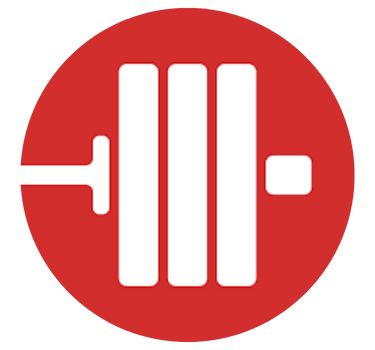
Stronglifts 5×5
Perfect for 5×5 workout and compound lifts, track progress, reset timer, clear vide demos.
Stronglifts 5×5 is slightly unique in that it is as much a weightlifting protocol as it is an app.
Stronglifts, or the 5×5 workout, is made up of:
Workout A: Squat, Bench Press, Barbell Row
Workout B: Squat, Overhead Press, Deadlift
You alternate between workout A and B, doing 4 workouts a week. Each exercise is… you guessed it… made up of 5 sets of 5 repetitions.
This may sound relatively simple, which is it, but don’t be fooled into thinking it’s not an incredibly tough exercise regime to follow.
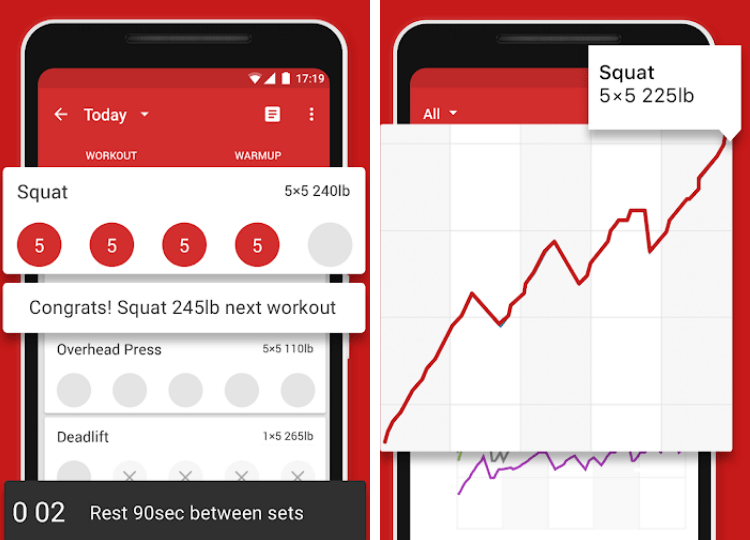
5×5 is great for building power and absolute strength, but less appropriate if you’re looking to tone up and sculpt your muscles.
If you like the concept of this approach to weightlifting, then you’ll love the Stronglifts app.
Future – Best for Personal Guidance
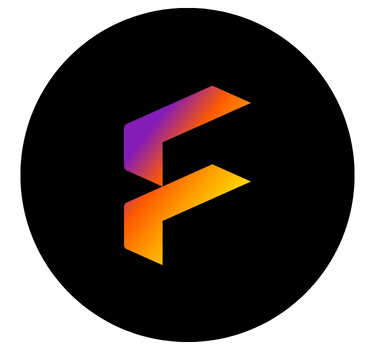
Future
Completely personalized weightlifting plans and daily support from a real human coach.
One of these apps is not like the rest…
Cue Future Fitness.
Future is a personal training app, that connects you to real certified coach. With the ability to direct message your coach 24/7, this app really takes personalized fitness to the next level.
Such features obviously come at a higher price than just a more traditional app, but the value can be monumental and really help you progress fast.
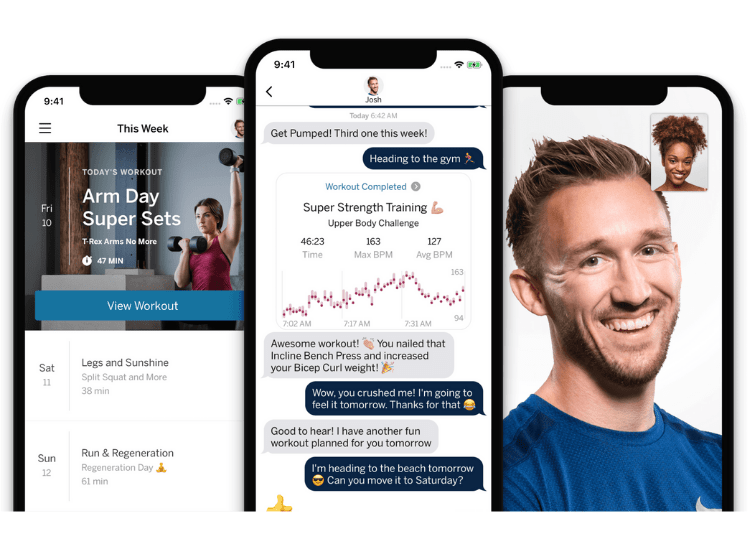
Your workout plan will be completely customized and you can even let your coach know personal preferences… e.g. you need to pick the kids up from school Tuesday morning so that workout needs to be under 15 minutes.
When you sign up for Future, you answer some questions about your goals and they match you with relevant coaches (you can also browse their full roster of coaches on their website). For weightlifting, you can simply select a coach that has experience and knowledge in weightlifting to ensure you get a workout plan that will help improve this side of your fitness.
Check out our full review of Future.
Bottom Line
When it comes to weightlifting apps, there are all sorts of options available to you. From free apps that offer basic workout logging, such as JEFIT, to apps that use artificial intelligence to create customized workout plans like Alpha Progression, they can all be effective at helping you get fitter and stronger.
Ultimately, the best weightlifting app for you will depend on your specific goals and preferences, but we think it’s definitely worth taking Alpha Progression and Fitbod up on their free trials as these apps offer very complete solutions for tracking and following weightlifting workouts… and they both have incredibly positive reviews on the app stores too.
We also think anyone lifting weights should start doing mobility sessions to see progress quicker… so an app like Pliability is worth trying too.
(Editor’s Note – We update this post every few months, to ensure it provides the most up-to-date information about each app, including new features or membership options).
Methodology
To create this roundup review, we used the following apps: Alpha Progression, Fitbod, Freeletics, BodyFit, Stronglifts 5×5, JEFIT, Strong, Centr, Sweat, Heavy, Future, FiiT, Tempo, RepCount, Blocklifts, Strengthlog, and Nike Training Club.
FAQs
Free Vs Paid Apps – What’s the Difference?
If you’re searching for any sort of fitness app, you’ll notice there are free and paid options. Free apps tend to have limited features and will also offer paid subscriptions to unlock the full app, or include ads as a way to monetize their business.
Paid fitness apps tend to include more features and leverage more technology more, such as using A.I. to generate workouts.
Lots of paid apps will include free trials, so we’d recommend signing up and seeing for yourself if they are worth the monthly cost.
What Features Make Great Weightlifting Apps?
The ability to log workouts is probably the most important feature for anyone lifting weights. Being able to track your progress will definitely help with motivation and make your training more effective.
Creating custom workout plans or following professionally created workouts are also features that we think are really useful for any sort of strength training. This allows you to tailor your training to specific goals, such as trimming down or bulking up.
We think exercise demonstrations would also be useful for beginners too. Having exercise alternatives (perhaps low-impact variations, for example) is another really helpful feature, especially for anyone who may struggle with certain movements and wants advice on exercises that work similar muscle groups.
Insights into muscle group recovery is also a great feature Fitbod initially launched (others are likely to follow suit), that means you can see what muscles are due to be trained and which ones need rest, based on your goals. This helps you understand how many days you should be training and when certain muscles need a rest to avoid overtraining them.
Weightlifting Vs Fitness Apps – What’s the Difference?
Weightlifting apps would be seen as a category of fitness apps… focused on helping users lift weights. Fitness apps can include more variety, such as calisthenics/bodyweight, running, cycling, and other forms of exercise. Weightlifting apps would be best suited to those who enjoy lifting weights (dumbbells, barbells, kettlebells, and other forms of resistance).
Related Articles:
Best Online Fitness Programs and Apps
